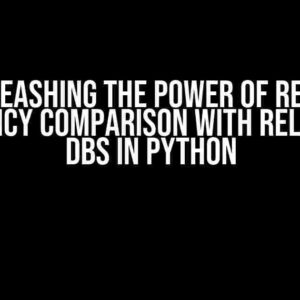As a Python developer, you’ve probably stumbled upon the mysterious __pycache__ folder lurking in the shadows of your project directory. But what is it, and do you really need to put it in both your project folder and apps folders? In this article, we’ll delve into the world of Python caching and provide you with a comprehensive guide on how to handle these pesky folders.
What is __pycache__?
The __pycache__ folder is a cache directory created by Python to store the compiled bytecode of your Python scripts. When you run a Python script, the interpreter compiles the code into bytecode and stores it in the __pycache__ folder. This process is called caching, and it’s meant to speed up the execution of your code by reducing the overhead of parsing and compiling the same code repeatedly.
Why is __pycache__ created?
Python creates the __pycache__ folder for several reasons:
- Faster execution**: By storing the compiled bytecode, Python can skip the parsing and compiling steps, making your code run faster.
- Improved performance**: Caching reduces the overhead of loading and executing your code, resulting in better performance and responsiveness.
- Better memory management**: By storing the compiled bytecode, Python can more efficiently manage memory and reduce the risk of memory leaks.
Do I need to put __pycache__ in both project folder and apps folders?
In short, no, you don’t need to put __pycache__ folders in both your project folder and apps folders. Here’s why:
In most cases, you can safely ignore the __pycache__ folder and let Python manage it automatically. Python creates the __pycache__ folder in the same directory as the Python script that’s being executed. This means that if you have a Python script in your project folder, the __pycache__ folder will be created in the same directory.
However, if you’re working on a larger project with multiple apps or modules, you might want to consider creating a separate __pycache__ folder for each app or module. This is because each app or module might have its own set of dependencies and requirements, and creating separate __pycache__ folders can help keep things organized and prevent conflicts.
Best practices for managing __pycache__ folders
Here are some best practices to keep in mind when managing __pycache__ folders:
- Let Python manage it**: Unless you have a specific reason to intervene, let Python create and manage the __pycache__ folder automatically.
- Keep it organized**: If you need to create separate __pycache__ folders for different apps or modules, keep them organized by creating a clear directory structure.
- Avoid duplicated __pycache__ folders**: Make sure you don’t create duplicate __pycache__ folders in your project directory. This can lead to confusion and conflicts.
- Delete unnecessary __pycache__ folders**: If you’ve made changes to your project structure or removed unnecessary scripts, delete any unnecessary __pycache__ folders to keep your project directory clean.
How to exclude __pycache__ from version control
One of the most common issues with __pycache__ folders is that they can clutter up your version control system (VCS) like Git. To avoid this, you can add the __pycache__ folder to your VCS ignore file.
# .gitignore __pycache__/ *.pyc
By adding the __pycache__ folder and the *.pyc file extension to your .gitignore file, you can tell Git to ignore these files and folders, keeping your version control system clean and organized.
Conclusion
In conclusion, you don’t need to put __pycache__ folders in both your project folder and apps folders. By following best practices and letting Python manage the __pycache__ folder automatically, you can keep your project directory organized and avoid potential conflicts. Remember to exclude __pycache__ from your version control system to keep your VCS clean and clutter-free.
Frequently Asked Questions
Here are some frequently asked questions about __pycache__ folders:
| Q: | What happens if I delete the __pycache__ folder? |
|---|---|
| A: | Deleting the __pycache__ folder will simply cause Python to recreate it the next time you run your script. This is because the __pycache__ folder is recreated automatically whenever Python needs to compile your code. |
| Q: | Can I customize the __pycache__ folder name? |
| A: | No, the __pycache__ folder name is hardcoded in Python and cannot be customized. |
| Q: | Should I include __pycache__ in my project repository? |
| A: | No, it’s recommended to exclude __pycache__ from your project repository to keep it clean and organized. You can do this by adding the __pycache__ folder to your VCS ignore file. |
By following these guidelines and best practices, you can effectively manage __pycache__ folders and keep your Python project organized and clutter-free.
Frequently Asked Question
Many developers have wondered about those pesky
Do I need to keep all __pycache__ folders in my project?
Nope! Those __pycache__ folders contain compiled Python bytecode and can be safely ignored. You can delete them without affecting your project. They’ll regenerate next time you run your Python code.
Why are there so many __pycache__ folders scattered around my project?
When you run your Python code, the interpreter creates a __pycache__ folder for each package or module to store the compiled bytecode. This allows for faster execution next time you run the code. It’s like a cache, get it? Hence the name __pycache__!
Can I add __pycache__ to my .gitignore file?
Absolutely! Adding __pycache__/ to your .gitignore file ensures that these folders and their contents won’t be tracked by Git, keeping your repository clean and tidy.
Will deleting __pycache__ folders break my project?
No, deleting __pycache__ folders won’t harm your project. The compiled bytecode will be recreated when you run your Python code again. Think of it as a harmless cache refresh!
Are __pycache__ folders specific to a particular Python version?
Yes, __pycache__ folders are specific to a Python version. If you’re using multiple Python versions, each will generate its own __pycache__ folder. Don’t worry, it’s all part of Python’s magic!


![Conquering the “Cannot get rid of ‘Make [field name] transient or serializable'” Warning from SonarLint on Intellij Conquering the “Cannot get rid of ‘Make [field name] transient or serializable'” Warning from SonarLint on Intellij](https://maleeq.hkhazo.biz.id/wp-content/uploads/sites/16/2024/07/conquering-the-cannot-get-rid-of-make-field-name-transient-or-serializable-warning-from-sonarlint-on-intellij-with-text-300x300.jpg)






